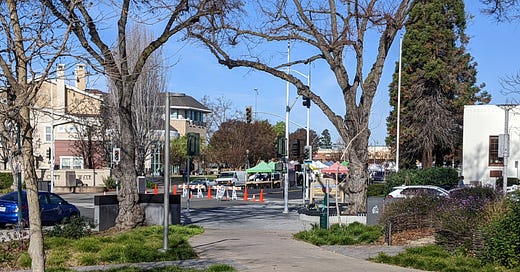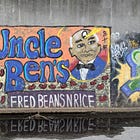Council Collars The CSC
In Which: The City Council restricts CSC after suggesting changes to Police advisory body, Council shows early signs of uneven enforcement, And What this all means to you!
City Council Revises Commissions
The City Council met last Tuesday to discuss changes to City Commissions. The changes include standardizing how Commissions operate, formalizing the Keep Hayward Clean and Green Task Force into a full Commission, and reigning in the activities of the Community Services Commission (CSC).
We covered previously how the City Council has sought retribution against the CSC for their past actions. The CSC recommended that the City Council reconsider the role of the Community Advisory Panel to the Chief of Police (CAP)—highlighting its drastically reduced membership, lack of transparency, and use in justifying Police policy that is harmful to the community. Mayor Mark Salinas said in a public meeting that the only reason Commissions were being examined was because of the CSC.
Concern with the CSC’s recommendations—often framed as “demands”—prompted the formation of an ad-hoc committee to suggest changes to the appointed bodies. At every public discussion, there has been a disconnect between the words of the City Council and City Staff. While presenting the recommendations, Assistant City Manager Regina Youngblood said that the purpose of the ad hoc committee was “to assess and improve the effectiveness of City Commissions.”
The reality, said multiple times by multiple City Councilmembers, is that the changes are punitive in nature, seeking to “reel back in” a Commission that “went off the rails.”
Let’s Make Things Clear
Many of the proposed changes attempt to unify the procedures for City Commissions by providing codified language for practices that were largely already followed. For example, the Uniform Guidance for the Operations of City Commissions lists things such as Brown Act compliance, Order of Procedure, Meeting Minutes, and Quorum and defines them explicitly, though much of this was already handled by City Staff.
Other changes include attendance requirements—which were already an item of evaluation by City Council when considering extending a Commissioner’s term—information on Conflicts of Interest, and explicitly stating Council’s role as final decision makers. The majority of the changes serve to reinforce Council’s already-existing role as sole Legislators and decision-makers for the City, and may be reacting to requests from the CSC often mischaracterized as demands.
There are also sections calling out Commission purview and decorum—a frequent topic of concern from Mayor Mark Salinas. The changes include decorum during meetings, but fall short of Mayor Salinas’s desire for regulating behavior outside of meetings which are protected by the First Amendment.
Also, in a section titled “Separation of Roles”, the changes insist that Commissioners not use their titles when advocating for issues during public comment. If enacted, Commissioners should not say that they are Commissioners unless they are representing the full Commission.
One issue that did not receive any attention, however, is how these changes affect the Planning Commission. They currently have no Council Liaison and have a Secretary position, in conflict with the proposed changes to Municipal Code. City Staff has said that the Planning Commission is special because it is defined by State Law, but never said where.
Clean and Green Commission
The Keep Hayward Clean and Green Task Force will change to the Clean and Green Commission. The membership will also be reduced from 20 to 18 with 2 alternates, their bylaws will be discarded in favor of the uniform procedures in Municipal Code, and their scope will include “recommending policies on litter reduction, waste management, community beautification, and sustainable practices. In particular, the commission will focus on litter collection, illegal dumping prevention, and community preservation, while providing advisory comments on relevant ordinances.”
Community Services Commission
The Community Services Commission, however, will see drastic changes to its purview—which was outlined in Municipal Code—with 8 of their 10 Powers and Duties removed or altered. The sections allowing the CSC to make and issue reports, make recommendations which will help develop a sense of community, and study the needs of community programs have been removed. The entire focus of the CSC now only revolves around funding allocation.
The membership was reduced from 17 to 11 “making it easier to achieve quorum.” Although the CSC did have issues achieving quorum for a brief period of time in 2023—due to the sudden change from online to in-person meetings—it has been a frequent talking point for members of the City Council. There is also explicit language throughout the ordinance and staff reports indicating that the CSC should focus on nothing beyond funding allocation.
When A Public Meeting Isn’t Public
During the question period, Councilmember Julie Roche—Chair of the ad hoc committee—asked for Assistant City Manager Youngblood to describe “the public input we got on this—the commissioner input and all of that.” ACM Youngblood said that they “held a public meeting,” but the meeting was not public nor covered by the Brown Act. Invitations were only extended to active Commissioners.
ACM Youngblood also said, “the Keep Hayward Clean and Green Task Force put together input collectively that they sent in to the ad hoc committee.” This is true and is reflected in the agendas at the time. However, when the CSC requested to do so, ACM Youngblood responded that it wasn’t allowed. Councilmember Goldstein also said that Commissioners were able to give individual feedback at the November 13 meeting. Although the video was not uploaded, the action minutes at the time say “commissioners are invited to provide your feedback at that time or via written public comment.”
Councilmember Syrop asked detailed questions about the term limits. The City Attorney explained that regardless of the situation—including partial terms—Commissioners may not be appointed beyond 10 years on a single Commission. So if a person begins by finishing a partial term, they may serve for one additional term, but if the second full term puts them over 10 years, they can’t be appointed again.
Mayor Salinas again asked if there was a section on conduct and behavior, and the City Attorney explained that there is a section on decorum during meetings.
Consistency Is An Issue Here
Multiple Hayward Youth Commissioners made public comment, seeking more collaboration and an expansion of topics covered by the Youth Commission. They were also introduced, by Mayor Mark Salinas, as Youth Commissioners, despite the recommendation in front of them barring Commissioners from self-identifying during public comment.
Councilmember Syrop noticed this and mentioned it during his comments. “Earlier we had Youth Commissioners come up and we identified them as Commissioners.” He pushed back on the language in the proposed handbook. “I don’t think any commissioner should represent the opinions of their Commission or the Council,” he said, “but I do think we shouldn’t punish if somebody wants to identify themselves as a Commissioner if they’re giving public comment.”
Councilmember Roche highlighted that she identifies herself as a Hayward City Councilmember regularly in other meetings, despite being on the body recommending the change. “I want it to be softer but clear language,” she said.
Councilmember Bonilla attempted to clarify the intent of the changes. “The intent is if they want to identify themselves as a Commissioner, that’s fine,” he said, “but they need to distinguish themselves if they’re advocating for personal issues that are unrelated to their role on a Commission.” Councilmember Bonilla has mentioned his own position on the Continuum of Care Board during multiple City Council meetings.
Councilmember Goldstein supported that intent. “We want people to stand up and speak but also appropriately disclaim that they’re not representing the views of the commission,” he said.
These comments give the impression that the City Council believes that Commissioners are always speaking on behalf of the full Commission whenever they use their title. Councilmember Roche alleged that she always says that she’s speaking on her own behalf when she uses her title in other arenas.
Some Commissions Are More Equal Than Others
Councilmember Roche framed the conversation as administrative streamlining. “My hope is that we can provide clarity for the Commissions going forward. I know it won’t satisfy everyone, but you know we’re trying to find a way to standardize what all Commissioners are doing.” On the subject of taking feedback from Commissioners, she said “I feel we’ve heard from everyone… because this has been a collaborative process, I support the recommendations as presented.”
Multiple members of the CSC have pushed back on the proposed changes, though no changes were made in response to their feedback.
Councilmember Andrews thanked the Library and Planning Commissions for being a template for the proposed changes. “[They’re] really providing a blueprint for how we should be welcoming Commissioners moving forward.” She provided no details around what recommendations came from those Commissions.
Councilmember Syrop praised the discussion and thanked Staff for making some minor changes. Regarding Council Participation as Liaisons, Councilmember Syrop said, “I’m glad that it says ‘should’ rather than ‘must refrain.’ I think it’s important for us to sometimes be able to weigh in and provide context to Commissioners.”
Councilmember Syrop was the only one to mention the CSC specifically, though his comments were mixed. “I had some heartburn because I’m a die-hard CSC participant,” he said, “but I understand the rationale behind them… [we should] consistently be cleaning up how we operate.”
Shortly after, however, his tone changed. “I understand the motivation to refocus the Community Services Commission for the time being,” Councilmember Syrop said, “but I do wanna say there’s so much more our residents have to offer the City in terms of their potential, their perspective, their education… We have these residents show up because we want to hear from them.
“I encourage… really exploring how do we provide more value with this Commission. And I understand there might be some time in between as we get back to business, but I hope we can grow to something that does provide a lot of value to the City because our community is our biggest source of power.” Councilmember Syrop highlighted the Public Safety Committee and reparative justice efforts as outcomes of the CSC’s advocacy and recommendations.
When They Show You Who They Really Are, Believe Them
If you’re not serving on a Commission, this probably won’t impact you directly. But it may have a chilling effect on Commissioners going forward. After pushing for the Apology to the Former Residents and Descendants of Russell City and recommending changes to the CAP, the City Council decided to push hard to restrict the CSC from doing anything like that again.
At the end of the day, the City Council created these bodies and they can remake them however they see fit. But by kneecapping the Community Services Commission when community members attempted to address social justice issues—something no other body had even tangential connection with—Council is showing their feelings about unwanted community input. This has always been about political retribution. According to multiple members of the CSC, Councilmember Goldstein said explicitly that the changes were retaliatory. “That’s just how politics works,” he said.
Another member of the CSC asked if it was similar to punishing a child for consistently breaking the rules and Councilmember Goldstein agreed. And they are well within their rights to punish the CSC, but the fact that the Council is trying to play it off as streamlining is disingenuous at best and cowardly at worst.
The City Council has made clear that they will punish input they don’t like if they have the power to do so. So if you’re hoping the Council will be welcoming community input on social justice issues, ask the Russell City Reparative Justice Project Steering Committee how things are going. They don’t seem very supportive of thinking outside the box.






